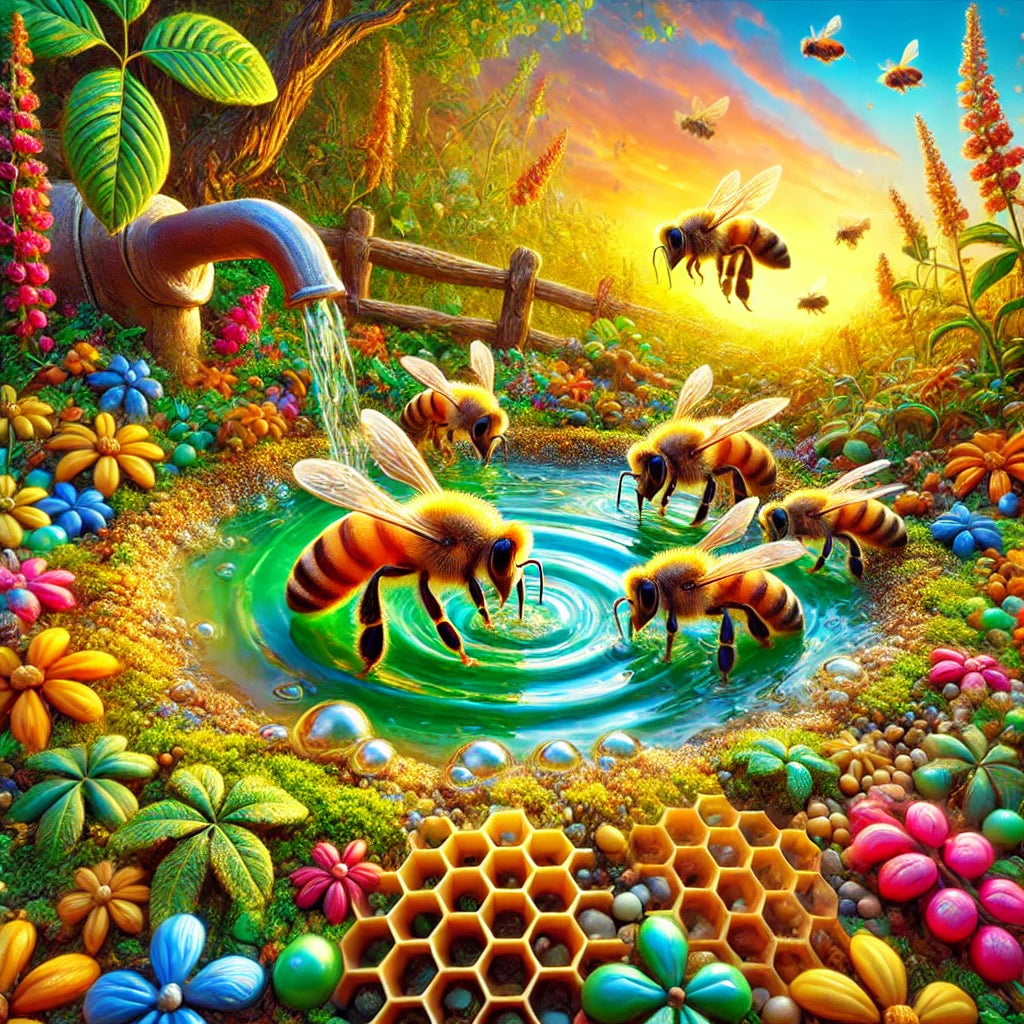Honey bees aren’t just flying to clear water for hydration; they’re seeking something much more beneficial hidden in the muck. These essential pollinators prefer “dirty” water sources that contain minerals and salts, crucial for their hive’s overall health. It’s these murky puddles, often overlooked by us, that provide the rich nutrients bees need to regulate hive temperature, feed larvae, and dilute honey.
Why are honeybees so vital to agriculture isn’t just about pollination—it’s also about creating an environment where bees can thrive, even if it means sipping from a less-than-ideal water source.
The Role of Water in a Bee's Life
Water plays a crucial role in the life of honey bees. They use it to maintain humidity in the hive, dilute honey, and cool the hive during hot weather. Worker bees seek out water sources and carry it back to the hive in their stomachs, passing it along to other bees. This communal process ensures that the entire colony benefits from the water brought back to the hive.
But not all water sources are equal. Bees are selective about where they collect water, often gravitating toward sources that contain a mix of nutrients, which is why bees are often seen at dirty puddles or even damp compost piles.
Why Do Bees Prefer Dirty Water?
The reason bees love "dirty" water is tied to its mineral content. Water from natural sources like puddles or mud often contains dissolved minerals, salts, and even small amounts of organic material that bees need to stay healthy. This mineral content is crucial for the proper functioning of the hive, particularly in processes like brood rearing and the production of royal jelly.
For instance, bees collecting water from damp soil may be getting traces of calcium, magnesium, potassium, and sodium—all of which contribute to a well-balanced bee diet. Clean, treated water often lacks these beneficial nutrients, which explains why bees may ignore your clean birdbath in favor of a muddy puddle.
In fact, attracting bees to beneficial water sources is part of proper hive management. Beekeepers often use tools like bee trap attractants to guide bees toward helpful sources and away from harmful ones.
Managing Water Sources for Your Bees
As a beekeeper, providing a water source for bees is critical to ensuring their productivity and health. Consider creating a bee-friendly water source with added minerals, such as a shallow dish filled with pebbles and salty water. This way, you can mimic the benefits of naturally "dirty" water, offering the bees both hydration and nutrition in one go.
For those managing large hives or how to start a bee farm, it's essential to monitor water intake during hot weather, when bees need to cool the hive more frequently. By offering mineral-rich water sources, you support the hive’s overall health and productivity.
Provide Your Bees with the Best Water Sources
The attraction of bees to dirty water is not random—it’s a survival mechanism. Bees prefer water sources that provide them with the essential nutrients they need to maintain hive health. By understanding what bees seek in water, you can create a supportive environment that promotes the well-being of your colony.
Ensure your bees have access to essential minerals and hydration. Visit Swarm Commander to explore products like bee trap attractants and beetle traps for beehives, which help support a healthy and productive hive.
Frequently Asked Questions About Water and Bee Health
Q1. Why do bees prefer dirty water?
Bees are attracted to dirty water because it contains minerals, salts, and other nutrients that are vital to their health. These trace elements support their biological functions and hive productivity.
Q2. How can I create a bee-friendly water source?
A shallow dish filled with pebbles and water, with added minerals like salt or calcium, can provide bees with a safe and beneficial water source. Make sure the dish isn’t too deep, so bees can easily access the water without drowning.
Q3. Why do bees need water in the hive?
Bees use water to regulate the temperature of the hive, dilute honey, and feed the larvae. Water is essential for maintaining a healthy, balanced hive environment, especially during hot weather.
Q4. Can bees get sick from dirty water?
While bees can benefit from the nutrients in "dirty" water, beekeepers should ensure the water isn't contaminated with harmful chemicals or pathogens. Providing clean, mineral-rich water can support their health without the risks.
Q5. How important are water sources for bees in agriculture?
Water is critical for maintaining healthy bee colonies, which are essential for pollinating many crops. Why are honeybees so vital to agriculture? They help pollinate about 75% of the world’s food crops, making water sources crucial for hive health and agricultural productivity.



